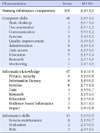Abstract
Purpose
The aim of the study was to identify nursing informatics competencies of nurses working for public health centers in Chungcheongnam-do.
Methods
Data were collected from June 10 to July 25, 2012 using the Nursing Informatics Competencies Questionnaire (NICQ). Data were analyzed by descriptive statistics, t-test, χ2-test, ANOVA and Pearson's correlation coefficient.
Results
Nursing informatics competencies of the subjects showed a mean score of 3.3±1.0 out of 5. As for scores of individual categories, the score for computer skills competencies was 3.3±1.0, informatics knowledge competencies 3.4±0.9, and informatics skills competencies 3.0±0.9. Nursing informatics competencies were positively correlated with the subjects' ages (r=.65, p<.001), computer usage hours (r=.23, p = .015), levels of demand for informatics knowledge (r=.51, p<.001), and informatics skills education (r=.78, p<.001).
Figures and Tables
References
1. Bickford CJ, Smith K, Ball MJ, Frantz G, Panniers TL, Newbold SK, et al. Evaluation of a nursing informatics training program shows significant changes in nurses' perception of their knowledge of information technology. Health Inform J. 2005. 11(3):225–235.
2. Chang J. Nursing informatics competencies required of nurses in Taiwan: A delphi method. 2007. USA: University of Utah;Unpublished doctoral dissertation.
3. Choi JA, Kim YH. Integrated information system for public health study on affecting factors. J Korean Assoc Reg Inf Soc. 2011. 14(1):73–92.
4. Chung SY. Nursing informatics competencies university hospital nurses in Korea. 2011. Seoul: Ewha Womans University;Unpublished master's thesis.
5. Eley R, Fallon T, Soar J, Buikstra E, Hegney D. The status of training and education in information and computer technology of Australian nurses: A national study. J Clin Nurs. 2008. 17(20):2758–2767.
6. Fetter MS. Baccalaureate nursing students' information technology competence-agency perspectives. J Prof Nurs. 2009. 25(1):42–49.

7. Hwang JI, Park HA. Factors associated with nurses' informatics competency. Comput Inform Nurs. 2011. 29(4):256–262.

8. Jette S, Tribble DS, Gagnon J, Mathieu L. Nursing students' perceptions of their resources toward the development of competencies in nursing informatics. Nurse Educ Today. 2010. 30(8):742–746.
9. Kim MH, Kim MS, Chae SW, Kim YS. Relationship of nursing informatics competency and self-leadership among hospital nurses. J Korean Acad Nurs Adm. 2007. 13(2):176–183.
10. Kim MS. Validity and reliability of informatics competencies for nurses among Korean nurses. J Korean Acad Adult Nurs. 2008. 20(3):470–480.
11. Kim MS. Role of self-leadership in the relationship between organizational culture and informatics competency. J Korean Acad Nurs. 2009. 39(5):731–740.

12. Kim SS, Ju HO. Factors affecting utilization of clinical nurses' hospital information system. J Korean Acad Nurs Adm. 2008. 14(4):440–447.
13. Korean Accreditation Board of Nursing Education. Message posted to electronic mailing list. 2012. Retrieved June 8, 2012. from http://www.kabon.or.kr.
14. Yi J, Park MH. Nurses' access & use of information resources and barriers & competency of evidence based practice. Korean J Adult Nurs. 2011. 23(3):255–266.
15. Lee SJ, Min BI, Han EK. A study on the improving performance of the health centers' information systems. Korean J Local Gov Stud. 2002. 6(4):65–84.
16. Lee SY. Demand search for regional public health information. Health Welf Policy Forum. 2006. 12:78–84.
17. Lin JS, Lin KC, Jiang WW, Lee TT. An exploration of nursing informatics competency and satisfaction related to network education. J Nurs Res. 2007. 15(1):54–66.

18. Ministry of Health and Welfare. Handbook of Health Promotion. 2008. Seoul: Author.
19. Ryu SW. Status and improving strategy of regional healthcare information system in Korea. Paper presented at the meeting of the health and welfare united nations conference. 2012. 04. Seoul, Korea.
20. Ryu SW, Jang YS, Lee SY, Lee HS, Yoon KI, Lee WJ, et al. Improving strategy of regional healthcare information system in Korea. 2006. Seoul: Korea Institute for Health and Social Affairs.
21. Schleyer RH, Burch CK, Schoessler VT. Defining and integrating informatics competencies into a hospital nursing department. Comput Inform Nurs. 2011. 29(3):167–173.

22. Staggers N, Gassert CA, Curran C. Informatics competencies for nurses at four levels of practice. J Nurs Educ. 2001. 40(7):303–316.

23. Staggers N, Gassert CA, Curran C. A delphi study to determine informatics competencies for nurses at four levels of practice. Nurs Res. 2002. 51(6):383–390.

24. Utley-smith Z. 5 competencies needed by new baccalaureate graduates. Nurs Educ Perspect. 2004. 25(4):166–170.




 PDF
PDF ePub
ePub Citation
Citation Print
Print







 XML Download
XML Download